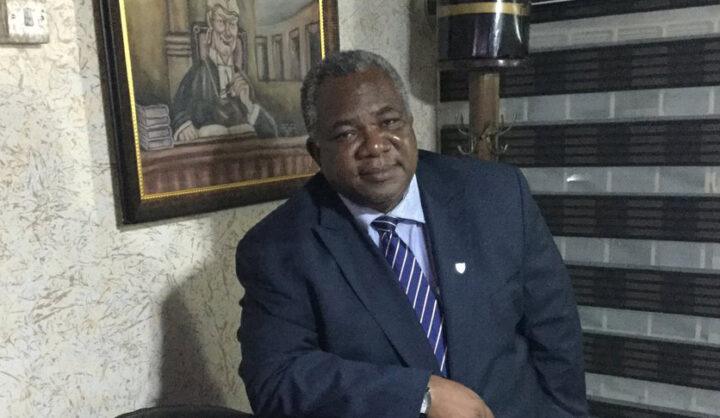Convicted Lawmaker Farouk Lawan Emerges from Disgrace with Presidential Pardon, Eyeing New Beginning

On a recent Thursday, former Kano lawmaker Farouk Lawan, who had been jailed for taking bribes while serving as the chairman of a House of Representatives ad-hoc committee, received a state pardon from President Bola Tinubu. This significant development saw Mr. Lawan pardoned alongside Anastasia Nwaobia, Hussaini Umar, and Ayinla Alanamu, with presidential spokesperson Bayo Onanuga stating that they were pardoned to enable their reintegration into society, having demonstrated sufficient remorse.
Mr. Lawan rose to prominence as the chairman of a House of Representatives ad-hoc committee investigating widespread fraud within the fuel subsidy regime in 2012. Ironically, he was known as 'Mr. Integrity' for his assertive anti-corruption posturing in the House, having led a group known as the 'Integrity Group' which championed the removal of the first female Speaker, Patricia Etteh.
During his investigation, Mr. Lawan was accused of demanding a $3 million bribe from businessman Femi Otedola to remove his firms from the list of companies indicted for fuel subsidy fraud. His committee had indicted Mr. Otedola’s Zenon Oil and Gas Ltd for fraudulently obtaining over $230 million from the Central Bank of Nigeria (CBN) to import petrol under the subsidy scheme, without actually importing the fuel. Subsequently, Mr. Lawan was convicted of receiving an initial $500,000 bribe from Mr. Otedola, after which Zenon Oil’s name was removed from the list of indicted firms.
The circumstances surrounding the bribe involved conflicting accounts. Mr. Otedola claimed he reported Lawan’s demand to the State Security Service (SSS), which then orchestrated a sting operation capturing the legislator collecting the bribe on video. Conversely, Mr. Lawan insisted he collected the money as evidence against Mr. Otedola but admitted to not reporting it to any law enforcement agency.
The legal proceedings against Mr. Lawan were initiated by the office of the Attorney-General of the Federation, with private prosecutor Adegboyega Awomolo, a Senior Advocate of Nigeria, filing charges under sections 18(1)(a) and 17(1)(a) of the Corrupt Practices and Other Related Offences Act, 2000. On June 22, 2021, Justice Angela Otaluka of the FCT High Court convicted Mr. Lawan on all three charges. In February 2022, the Court of Appeal affirmed his conviction but exonerated him on two counts and reduced his seven-year imprisonment to two years. The Supreme Court subsequently affirmed this conviction. After serving five years, Mr. Lawan was released from prison last October.
This presidential pardon places Mr. Lawan among other high-profile politicians previously jailed for corruption but controversially pardoned by political authorities, such as former state governors Joshua Dariye of Plateau State and Jolly Nyame of Taraba State under the Buhari administration. These individuals were among 159 convicted persons whose pardon was approved by the Council of State at the time.
Mr. Lawan’s arrest and conviction severely damaged his reputation and political career in his home state of Kano, where he was once influential. While the presidential pardon legally clears his path for a return to active politics, observers suggest he still needs to secure a 'societal pardon' to fully restore his standing. Following his release from prison, there were speculations he might switch from the opposition People’s Democratic Party (PDP) to the ruling All Progressives Congress (APC) in preparation for a political comeback.
Reacting to the pardon, Mr. Lawan expressed profound gratitude to President Tinubu, describing the gesture as divine mercy and a new beginning. In a statement titled “My Hope Is Renewed, Mr President,” he remarked, “Mr President has cast a warm blanket over me, pulling me back from the harshness of yesterday’s cold.” He added that his faith in God and the nation remained unwavering throughout his ordeal, and the experience had imparted lessons in humility and reflection, renewing his sense of purpose and dedication to Nigeria’s ideals: “A re-dedication to the ideals of Nigeria is upon me. My hope is renewed.”
The granting of this prerogative of mercy was advised by the National Council of State, a pivotal organ of the Nigerian Government as outlined in the Third Schedule Part 1B of the 1999 Constitution (as amended). Comprising the President (Chairman), Vice-President (Deputy Chairman), all former Presidents and Heads of Government, all former Chief Justices, the President of the Senate, the Speaker of the House of Representatives, all state governors, and the Attorney-General of the Federation, the Council holds the power to advise the President on matters including the national population census, the prerogative of mercy, and the award of national honours.
You may also like...
Super Eagles Narrow Escape: Cracked Windscreen Forces Terrifying Emergency Landing Mid-Flight
)
The Super Eagles' travel to Uyo for their vital World Cup qualifier against Benin Republic has been delayed after their ...
Chelsea & Liverpool Legends Brawl: Diego Costa's Wild Foul Steals Show, Mikel Obi Shines

In a captivating Chelsea vs. Liverpool Legends charity match at Stamford Bridge, Ryan Babel scored a late winner for Liv...
Spidey-Verse Expands! 'Your Friendly Neighborhood Spider-Man' S2 Drops Fall 2026, Unveiling Venom & Gwen Stacy!

Marvel Animation announced that “Your Friendly Neighborhood Spider-Man” Season 2 will launch on Disney+ in fall 2026. Th...
Bloody Brawls & Fan Favorites Return! 'Daredevil: Born Again' Season 2 Footage Shocks MCU Fans

The highly anticipated second season of <em>Daredevil: Born Again</em> is set to premiere on Disney+ in March 2026, brin...
Questlove Accepts Peabody Trailblazer Award, Declares 'Joy Is Rebellion'

Ahmir “Questlove” Thompson was honored with the 2025 Peabody Trailblazer Award for his impactful storytelling and advoca...
Tragic Loss: Argentine Singer Fede Dorcaz Fatally Shot Before TV Debut

Argentine singer, actor, and model Fede Dorcaz, 29, was fatally shot in Mexico City in what authorities suspect was an a...
Strictly Sensation: Tess Daly Wows in Stunning One-Shoulder Dress

Strictly Come Dancing presenter Tess Daly made a stylish impression in a Karen Millen one-shoulder ruched maxi dress, in...
Literary Star Shines Bright: Oyin Olugbile Bags $100k Nigeria Prize!

Oyin Olugbile has been named the winner of the 2025 Nigeria Prize for Literature for her debut novel, “Sanya.” This pres...




